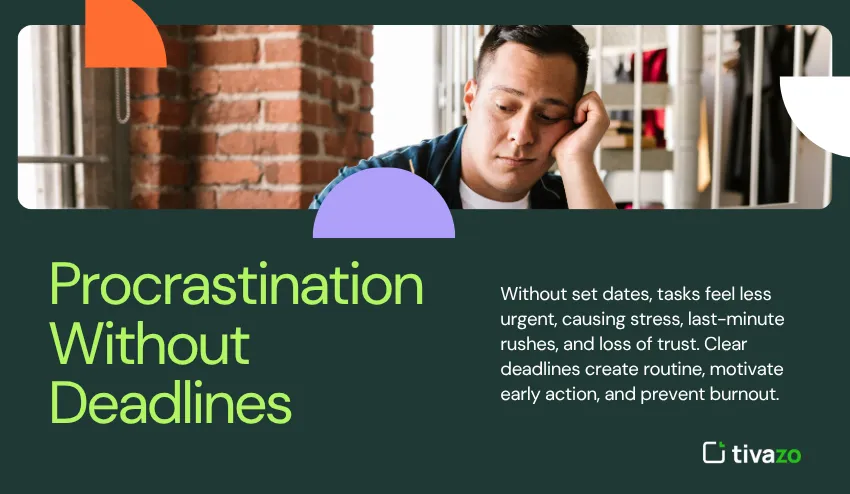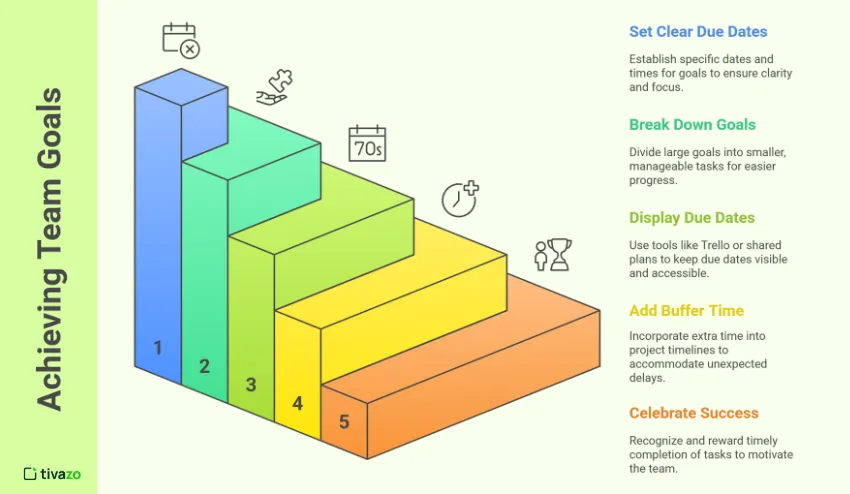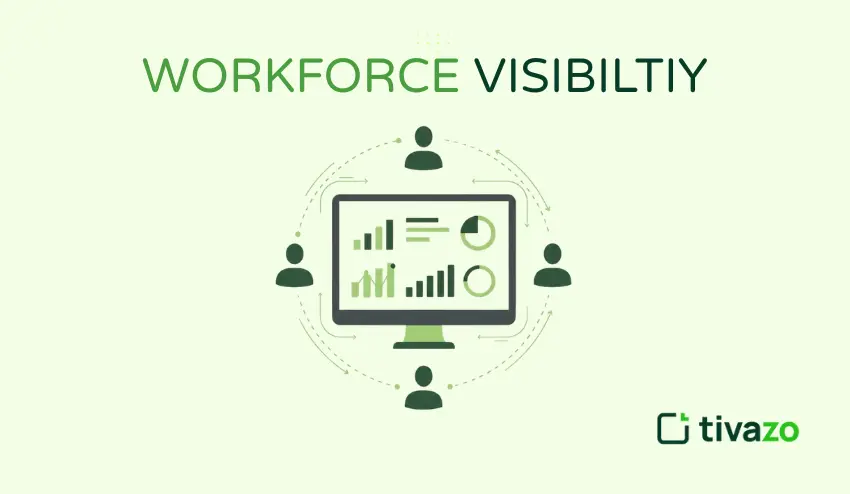Have you ever had to work quickly on a project or report that you knew about for weeks? You might feel like you need to meet deadlines, but don’t want to if you work on a busy team, handle people who work from home, or just have a lot to do at work.
But the truth is that clear and well-managed schedules are one of the best ways for any business or worker to get things done. They help people do their work, stay on goal, and stay on the same page as their teams.
It is important to have clear dates for getting work done. Clear deadlines help teams work together and handle their time better. Smart tools can help make sure that deadlines are met. You’ll learn useful ways to keep your team on track and moving forward, whether you’re running an online team or trying to make your business bigger.
The Psychology Behind Deadlines and Workplace Productivity
What is it about due dates that makes them so useful? It has to do with how our minds work.
How Time Pressure Focuses People

Having a deadline makes things feel important, which helps you forget about other things. Every day, you have a lot of emails, Slack messages, meetings, and work to do. It’s simple to forget what’s most important. As soon as there is a hard goal, especially one that everyone on the team has to meet, people get to work right away.
A due date is like a bright light in your mind. “This is important now,” it tells your brain. Even the most important projects can get lost without that light.
When goals are set up front, teams don’t have to deal with the stress of rushes at the last minute. They instead have a steady drive that makes them do better work.
For students who balance studying and part-time jobs, clear deadlines are critical. Knowing exactly when tasks are due helps them prioritize assignments and stay on track despite busy schedules. Many rely on a personal statement helper to organize tasks and keep up with assignments efficiently. Learning to meet deadlines consistently builds habits that enhance productivity in both academic and professional life.
Why Vague Deadlines Kill Efficiency
Here are two ways to give someone a job:
- “Finish the draft by the end of next week.”
- “Send in the final draft by 4 PM on Wednesday.”
Which one could be done?
People put things off when they aren’t sure what to do. When people on a team don’t know when something is due, they often put it off. There is more than one job that is slowed down by this delay. It also stops team projects from going forward and annoys managers.
On the other hand, goals that are clear and set on time help with organizing and preparing. They’re very important for:
- Set due dates for projects that are right
- Things delivered on time
- A fair split of the work
- Responsibility made clear
How Deadlines Enhance Time Management and Project Execution
It’s not just that deadlines make you feel stressed; they also help you stay on top of things. Professionals and teams can better plan their time when they have a clear limit.
Putting projects into stages or milestones
It can be hard to handle big tasks. That’s when milestone-based due dates come in handy. Break the job up into smaller, more doable parts instead of giving it one due date:
- Week 1: Making plans and studying
- Week 2: Make a first draft or mold
- Week 3: Read over and share your thoughts
- Week 4: Last delivery
This plan works best for groups and teams that work on more than one thing and need to keep track of how things are going. Everyone can follow the same road thanks to milestones. This keeps jobs from getting stuck or lost.
Prioritizing with Purpose
When people have a lot of work to do, clear due dates help them figure out which jobs are the most important and should be done first. People on the team can look at:
- What should I do today?
- What can wait until the week is over?
- What chores are stopping you from doing other things?
This kind of time planning helps the team focus on what’s most important and makes the best use of their time and resources.
Combating Procrastination in Professional Environments
Let’s be honest: putting things off doesn’t go away when we grow up or start working. Maybe you check your email too much, start tasks that don’t require much work, or put off making tough decisions.
Procrastination Without Deadlines

When dates aren’t set in stone, tasks become less important. At work, people and groups may feel like they have “plenty of time,” which can cause stress and last-minute rushes. Clients and teams who don’t follow the same plan can also lose trust.
On the other hand, having clear due dates sets a routine. They tell people to get going earlier, keep going, and not get tired during the last-minute rush.
Ditching the Panic Mode
There are times when we all feel like we don’t have enough time to finish a plan, slide deck, or campaign before a meeting. Things get worse, there’s more stress, and the team’s confidence drops.
Thanks to set dates and internal checkpoints, the “panic mode” is no longer the rule. It’s about turning chaos into calm efficiency so you can finish your work faster, better, and with less stress.
Building Accountability Across Teams and Departments
Setting due dates not only helps, but it also makes people feel responsible. People are responsible for their own work and the team’s work when they know what they need to do, when they need to do it, and why.
Being responsible makes you stronger on your own
People can better handle their own time when they know what they need to do and when they need to do it. Because micromanaging doesn’t work or make sense for online teams, this freedom is important.
Collaboration Through Shared Deadlines
When people work together, especially on projects, deadlines help keep things going. People are more likely to do their work on time if they understand how it fits into the bigger picture.
As an example:
- Before marketing can start a campaign, the design has to finish the images.
- Builders can’t release features to the public without QA testing.
- Before they pitch, sales need to finish their talks.
When departments have clear goals that are linked, they can work together better.
How Clear Deadlines Impact Workforce Productivity and Business Outcomes
Having clear goals is important for business because they help get results that can be tracked. Whether you have five or fifty people on your team, deadlines help you do better:
- Due dates for completing jobs
- How happy people are
- How well workers do their jobs
- All-around work output
When they are part of your workforce management tools, they help you make plans that are based on reality, get things done faster, and keep track of success based on data.
Smart Tools to Manage Deadlines More Effectively
You don’t need a paper calendar to keep track of everything. In a world where offices are digital and jobs are done automatically, smart tools can help you remember when things need to be done.
Recommended Tools for Teams and Managers
There are a few tools that can help you manage your time and get things done on time:
- With visual boards and due dates, Tivazo, Trello or Asana are good for keeping track of projects and tasks.
- You can keep track of your projects, papers, goals, and calendars all in one place with Tivazo, a productivity tool.
- You can use Toggl Track to keep track of how long you spend on jobs that need to be done by a certain date.
- Notion is a great app for making project screens with reminders, notes, and due dates.
- Integration between Slack and Google Calendar: Get alerts and notes about due dates in the chat tool your team uses.
These tools help you set due dates and send notes. They also make it easier for teams to see what’s going on and automate processes.
How to Get Your Team to Meet Their Marks

These tips will help you set goals that get things done without putting too much stress on your team:
- Make certain that your due dates are clear and attainable. Pick clear dates and times for your goals instead of making them too general.
- Cut up big goals into little ones. Every week or every other week, checkpoints help keep things in order.
- Display the due dates. There are other tools like Trello, shared plans, and screens that you can use.
- Add some more time. Plan projects one after the other, but leave some room for what might happen.
- Enjoy getting things done on time. People want to keep doing their best when they get praise and small wins.
Deadlines Are a Superpower for Productive Teams
These aren’t just dates; they’re ways to get things done. People use them to stay on track, hold each other responsible, and work together to reach their goals. It’s not enough for companies to just meet more goals; they also need to make sure that the right things get done on time and better.
Here’s the first thing you should do to get your workers to work harder, make projects run more easily, and build a results-driven culture: You should set clear due dates that you can meet.
There’s no need to do more in the future. It’s always about finishing the most important tasks on time.




